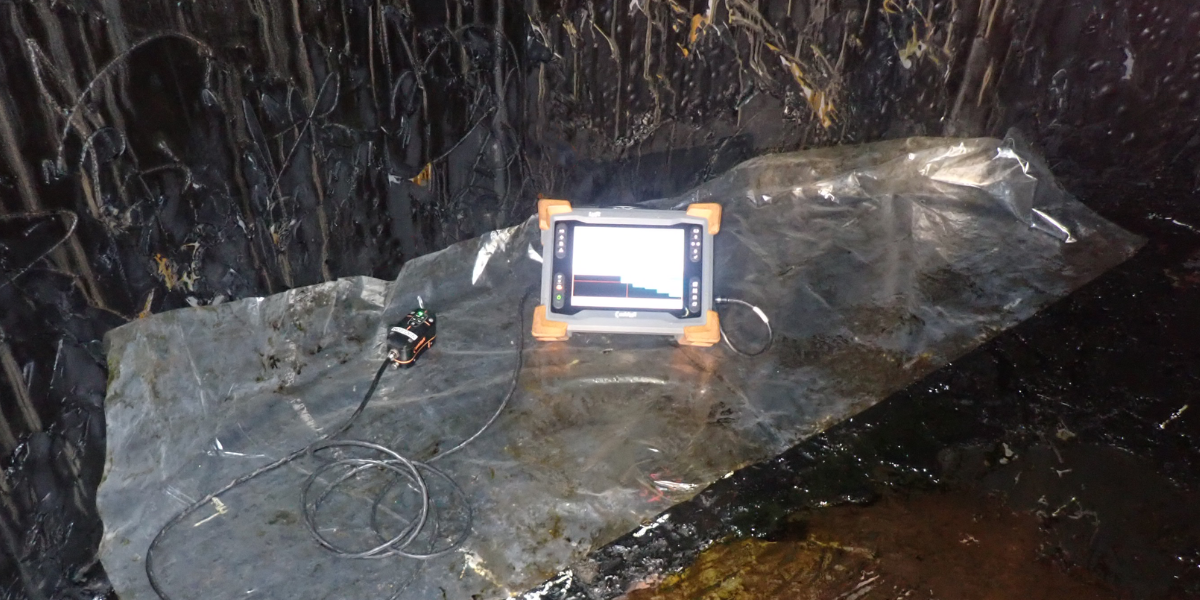Corrosion Under Insulation (CUI) Detection with Pulsed Eddy Current Examination: prevention and detection.
In this blog article, we’ll discuss the challenge of Corrosion Under Insulation (CUI) detection and the benefits of using Pulsed Eddy Current (PEC) to address it. We also discuss the applications of PEC in the pipeline and petrochemical industries, where CUI is likely to occur due to the specificities of the environment. Finally, we provide a success story of how Nucleom used PEC inspection to help a client to detect CUI and optimize its maintenance plan. We also mention complementary inspection solutions like Phased Array Ultrasonic Testing (PAUT), Radiography (RT), and 3D scanning, which, when combined, allow for complete monitoring of corrosion/erosion.
Introduction
Corrosion Under Insulation (CUI) is a significant issue in industries that use insulated pipelines or vessels to transport liquids or gases. CUI usually occurs when moisture is trapped in the insulation and reacts with the metal surface, leading to corrosion. This can cause leaks, downtime, and even safety hazards. Fortunately, there are ways to detect CUI before it becomes a major issue, and one of the most effective techniques is the Pulsed Eddy Current (PEC) inspection method.
Applications
Pipeline Industry
CUI can occur on pipelines that transport oil, gas, and other products. Pipelines become corroded due to moisture present on the external surface of insulated pipelines (moisture may be external or may be present in insulation). Harsh environments, such as offshore platforms, deserts, and arctic regions increase the probability of CUI apparition as pipelines are exposed to extreme temperatures and weather conditions. CUI can also occur in areas where there are significant temperature variations, such as at pipeline supports or where the pipeline passes through walls or floors.
Petrochemical Industry
Equipment and infrastructure, such as tanks, vessels, and piping systems, are often insulated to maintain the temperature and prevent heat loss. These insulation layers can trap moisture due to water intrusion (depending on multiple factors like temperature, humidity, etc.), leading to CUI. The chemicals used in the petrochemical industry can also accelerate the corrosion process, making it even more crucial to identify and mitigate CUI.
Benefits of Using PEC for CUI detection
PEC inspections offer the advantage of being conducted in-service, allowing for uninterrupted production, thus no loss of productivity. Using PEC, there is no need to remove insulation or fireproofing, which can be a time-consuming and costly process, making PEC an efficient inspection technique.
Success Story
A client in the petrochemical industry approached Nucleom to perform inspection on their insulated steam lines, concerned about the potential for CUI and its impact on their operations. Nucleom’s PEC inspection revealed areas of wall loss due to corrosion and provided the client with valuable data on the damage. Based on the data provided, the client was able to make informed decisions and decided to replace the damaged section. Thanks to Nucleom’s PEC inspection, the client optimized its maintenance plan and the cost associated to the corrosion on its steam lines.
Complementary Services for CUI Detection
Nucleom offers CUI complimentary inspection solutions like Phased Array Ultrasonic Testing (PAUT), Radiography (RT), and 3D scanning. As PEC, all these methods do not require insulation removal and when combined, allow for a complete monitoring of corrosion/erosion.
 If you’re interested in learning more about our CUI inspection solutions or would like to discuss your inspection needs, contact our SALES TEAM. We are available to help you in your project.
If you’re interested in learning more about our CUI inspection solutions or would like to discuss your inspection needs, contact our SALES TEAM. We are available to help you in your project.
To learn more about Pulsed Eddy Current
About us
Nucleom, a Canadian NDE company founded in the province of Quebec, has been extensively involved in non-destructive examination services in Canada and internationally since 2010. A combination of site experience and NDE tool design know-how gives Nucleom an in-depth perspective of on-site challenges for the NDE system operation. Nucleom’s expertise extends into areas of NDE tool development, tool integration and site inspection campaign execution. Nucleom now has offices in Quebec (Quebec City/Montreal), Ontario (Whitby/Kincardine) and Alberta (Edmonton).
